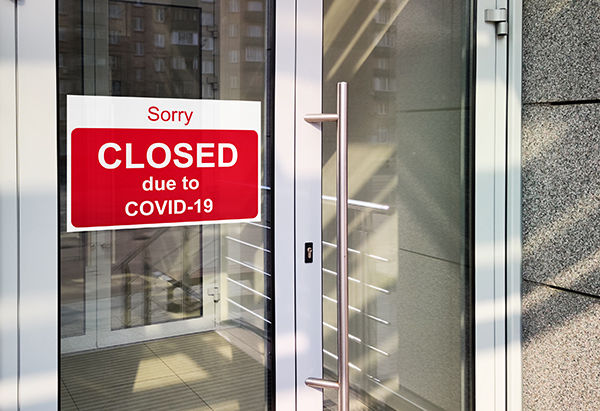eNews April 23
In the News
April 23, 2020
Remote Workers Keep Credit Department Safe from Coronavirus-Related Fraud
—Andrew Michaels, editorial associate
Scammers are always looking for “the next best thing” to exploit solely for the purposes of defrauding others. In the business-to-business (B2B) credit arena, the latest swindles are taking advantage of the COVID-19 global pandemic, which criminals are using to gain access to credit departments’ financials and other confidential information. The likelihood of exposure to such fraud heightens for those working remotely as many now operate without the top-of-the-line security and detection services that protect them in the workplace. So how can credit managers stay alert? Caution is key.
Two months after the virus first appeared in the U.S., the Federal Trade Commission (FTC) identified several coronavirus-related scams affecting credit professionals, ranging from the fear-centric public health and government check scams to the classic business email, I.T. and supply scams. Unlike the business email or I.T. scams that criminals merely recycle to fit the situation, scams involving public health and government checks are more dependent on the coronavirus because they utilize fear to spark a response. For example, the current FTC-identified public health scam sees fraudsters taking advantage of the public health scare by posing as knowledgeable officials from the Centers for Disease Control and Prevention (CDC) or World Health Organization (WHO) who are asking for confidential information, e.g., Social Security numbers and tax IDs, in order to provide companies with guidance. Other criminals may also use this scam to provide links or downloads that contain important information pertaining to COVID-19. Out of sheer interest, victims may unknowingly give fraudsters access to their company’s network via malware by clicking on the tainted links. Similarly, government check scams offer so-called financial support to businesses, yet require the victim to provide confidential information for said support.
One particular coronavirus-related scam relying on old-school techniques is the business email compromise (BEC) scam. BEC is when a fraudster communicates with a company via email and impersonates the company’s CEO or another senior-level employee to get confidential information. The FTC states criminals are leaning on this tactic because companies are engaging in “a flurry of unusual financial transactions” during COVID-19, including expedited orders, canceled deals, refunds, etc.
“That’s why an emergency request that would have raised eyebrows in the past might not set off the same alarms now,” the FTC reported. “Compounding the problem is that teleworking employees can’t walk down the hall to investigate a questionable directive.”
Fortunately, many credit professionals who are currently working remotely, said their companies already have plans in place to do so securely. Credit professional Ed Bell, DBA, CBA, ICCE, said all of his company’s employees who are working from home must use company-provided equipment that operates using secured company VPN networks.
“We use an enterprise wide system (ERP) that tracks employee activities,” Bell said. “We also use business job function segregation to prevent the possibility of fraud from the home office environment. We have had some outside agents attempt to take advantage of the current situation with COVID-19; [however], identified fraudulent activity was stopped, tracked and reported to senior leadership.”
Bell said his company has strong security measures in place and dedicated managers and team leaders who monitor work activity and remain in close contact with supervisors and team members. It is important for credit managers to remain vigilant and communicate frequently with staff, he added, while monitoring orders, customer requests and team productivity.
At Steelscape, LLC, Credit Manager Connie Woodward-Haas, CCE, said her department has similar measures in place, with employees using a single login system on company laptops as well as secure drives to retain customer data and share internally as appropriate.
“SharePoint for managers also has appropriate safeguards and restrictions,” she noted. “As always, [you want to] watch for fraudulent emails and links [and] make sure certain appropriate back-ups are performed.”

Due to the COVID-19 pandemic, NACM has made the difficult decision to cancel the in-person elements of its Credit Congress & Expo scheduled for June 14–17, 2020 in Las Vegas.
NACM’s 2020 Credit Congress & Expo will now be available online.
Registered delegates will have access to:
- Sessions via webinar (recorded and live); available for access at your convenience
- The ability to listen and learn from unlimited presenters
- CEUs (continuing education units) and CCE recertification points
- Expo Showcase, highlighting the vital products and services from our service provider partners
- Plus, free bonus content
If you have not yet registered, you still can! Access will be available through August 31. Registration details and pricing will be available soon on the Credit Congress website.
Education and information will be more essential now than ever. Don't miss all of the online opportunities that Credit Congress & Expo 2020 will provide.
COVID-19 Interrupting Retail Industry
—Michael Miller, managing editor
“You can run, but you can’t hide,” is unfortunately coming to life during the events of the coronavirus outbreak. Businesses, large and small, individuals, small-business owners—the pandemic is here with no place to take shelter even with stay-at-home orders across the U.S. It is well known the travel and hospitality industries have been crushed by COVID-19 due to the lack of travelers. Because of the level of hardship airlines have faced, and the portrayal of that in the media, some industries were overlooked at first. After the shock of a spring with no sports, the talk of stimulus checks, work-at-home orders and the impacts of COVID-19 on the health industry subsided somewhat, other issues have come to light. Mainly the effect of the outbreak on the food/restaurant industry and on the retail industry.
Obviously, with brick-and-mortar storefronts closing, sales have dipped across the industry. According to the Census Bureau, retail sales declined a record 8.7% in March. However, not all sectors felt the same burn as essential businesses such as grocery stores remain open. Grocery store spending grew exponentially in March, which is usually a slow month without Easter sales. Wells Fargo Securities states levels will drop back slightly after the surge of panic buying dissipates.
“Aside from temporarily closing our doors, we have also experienced severely reduced sales and receivables,” said Haley Hagin, CBA, accounts receivable supervisor with Superfeet Worldwide, a footwear retailer. Her customers are dealing with the same outbreak as everyone else. They are closing their doors, affecting their ability to pay bills. “Some of them are trying to focus on online sales and curbside pickup, but it is only a fraction of their normal business.”
The effect on credit departments is directly related to decisions by other organizations and governments—not lack of payments or late invoices. “Our business has dropped in volume because of the cancellation or postponement of events like the NCAA basketball tournament and some major golf tournaments,” said Mike Hopkins, CBA, director of corporate credit with Paramount Apparel International.
But the impact of the coronavirus isn’t just about money, it’s about people too. “I have had to furlough my staff, and I am operating the department by myself,” Hopkins added. Each situation is different depending on the industry and the business. For Kim Kesler, vice president of credit with Weyco Group, “the biggest impact is on the people. … No one has been furloughed or lost jobs at this point.” Weyco has also seen a significant increase in eCommerce sales; however, it is not large enough to counter what has been lost.
Credit department contact with customers and fellow credit professionals has also changed, resulting in different collection language and altered communication. Weyco has removed standard collection language when sending out account statements. While no longer meeting in person, one thing that hasn’t changed is creditor relationships. Kesler has had a couple virtual credit meetings. Credit groups allow members to “trust someone for accurate information. That hasn’t changed,” Kesler said.

This course satisfies one of the two CBF designation course requirements. Visit the Credit Learning Center (CLC) or contact the NACM Education Dpt. at This email address is being protected from spambots. You need JavaScript enabled to view it. or 410-740-5560 to learn more.
Securing Mechanic’s Liens in Rhode Island During the COVID-19 Crisis
—Cheryl Allen-Ricciardi, Esq.
The current COVID-19 crisis has complicated all facets of life, including securing mechanic’s liens. Properly notarizing your lien and recording the lien are crucial steps to securing a valid and enforceable mechanic’s lien in Rhode Island. While Rhode Island has implemented some procedures to remotely notarize documents, and in some instances, e-record documents, neither procedure is without its hiccups.
One of the first crucial steps in securing your mechanic’s lien is filing your notice of intention (“NOI”) pursuant to RIGL § 34-28-4. The statute requires that the NOI be executed under oath. With mandated office closures and social distancing orders in place for the foreseeable future, how do you go about completing this essential step? On Apr. 3, 2020, the Rhode Island Secretary of State announced that it is temporarily allowing remote online notarization (“RON”). RON, while helpful under these circumstances, presents its own headaches. Here are the steps to get your NOI notarized:
- Find a notary who is authorized to perform RON. The temporary RON requires current or new notaries to utilize recognized and approved service providers (currently, DocVerify, Inc. or Paravaso) for RON transactions and submit an application to be an authorized RON notary to the state.
- Once you have located a notary authorized to perform RON, you must then send the document to be notarized to the notary.
- Next, perform the RON procedure with the notary. This requires a web camera and internet connection. The notary will be able to walk you through this process, but note that Zoom and FaceTime are not permitted to perform remote notarization.
- Mail your signed document to the notary for application of the notary’s official stamp. Ask the notary to send the final notarized document to you or your attorney.
The NOI must be served on the property owner within 200 days of completing the work or furnishing the materials, so the additional time to complete the remote notarization must be factored in.
Now that the NOI is notarized, it must still be recorded in the land evidence records in the city or town in which the land as described in the NOI is located. Most city or town halls are closed to general foot traffic in order to minimize the spread of the coronavirus but are accepting recordings by mail. The appropriate recording fee should accompany the documents to be recorded. Some towns in Rhode Island are even encouraging e-recording. For example, Providence is accepting e-recording through CSC Global. A computer, scanner and internet connection are required for e-recording. See Providence Recorder of Deeds website for additional information. Pawtucket, Richmond, Smithfield and Westerly also use CSC to e-record documents.
Within 40 days of filing your NOI, you must then file your complaint and lis pendens. The lis pendens should follow the same notarization and recording procedures described above, but within a much shorter timeframe. It is important to accurately calculate filing deadlines so as not to lose your mechanic’s lien rights.
Cheryl Allen-Ricciardi, Esq., is an associate in Pierce Atwood's Litigation Practice Group. Cheryl represents clients in complex commercial matters, including class actions, employment-related disputes and internal investigations. She also has transnational experience with offices of institutional integrity of multilateral development banks.

Get Your Freshly Investigated Credit Report—Tomorrow
Order what you need, when you need it, with FCIB Next-Business-Day Credit Reports.
FCIB offers a quicker delivery speed for credit reports in more than 60 countries. Our next-business-day credit reports are freshly investigated, concise and cost-effective without the expense of a high-volume contract.
Get the business and credit details to set credit limits quickly, including:
- Key corporate facts from the local registry
- A robust predictive credit risk rating
- Maximum credit recommendation
- The latest filed financial statements
To learn more, please contact David Anderson at +410-423-1840 or This email address is being protected from spambots. You need JavaScript enabled to view it..
How Customers in the Automotive Supply Chain Can Prepare for Distressed Suppliers Resulting From COVID-19
—Sheryl L. Toby, Esq.
The full extent of disruption caused by COVID-19 is unknowable at this time. However, it is likely there will be suppliers unable to economically weather the storm. Having represented manufacturing customers and suppliers for decades, one thing is certain: Even the most sophisticated entities make costly mistakes in addressing distressed suppliers without realizing they paid more as a customer than was necessary. “We only know what we know,” and preparing a customer to successfully address distressed supplier situations requires a different skill set than in representing or being a quality supplier.
Wrong moves at the very outset of troubled supplier matters can be the most costly. Immediate preparedness can reduce costs. For example, often a “Tier 1” manufacturer acts also as a “Tier 2” by selling product to its supplier, which the supplier then works on and sells back to the Tier 1 manufacturer. Failure to recognize that situation or have advisers that understand the resulting practical, financial and legal implications and how they relate to other customer positions can lead to losses that could have been avoided by early action.
The following are a few proactive steps to take now to better maintain continuity of supply and reduce costs:
1. Identify and categorize which suppliers are now likely to face financial distress the quickest.
Consider working from the bottom-up by first focusing on small but critical suppliers. Smaller supplier distress cases can cause great risk compared to the size of the company and can be more challenging and costly to rectify on a relative basis. Often, there are limited market investment resources and less tolerance by the supplier’s lenders than is needed by customers to work through continuity of supply.
2. Recognize and act upon the signs of trouble.
Lately, we have seen more and more companies shut their doors ostensibly “without warning” when, in hindsight, there were warning signs that were either not identified or acted upon.
For example, a failed sale process often leads to liquidation which can be extremely costly for a customer that might have to prop the supplier up until alternative arrangements are made, assuming the supplier’s lender will even work with the customers to give time to make alternative arrangements. Indeed, we have faced a number of lenders lately that simply refused to do anything other than immediately shut down and liquidate the company after a failed sale process, leaving the customers with no option but to take aggressive steps to avert shutdowns.
What can you do when you learn that a small company/good quality supplier is entering a sale process, other than say, “keep us posted?” Sometimes, if customers are realistic in assessing the likelihood of a successful sale, disaster can be averted.
Other signs that may seem obvious but are often overlooked include identifying suppliers that changed lenders to utilize nontraditional financing or rely on capital from entities that invest in distressed companies.
3. Put distressed supplier protocols in place now.
The author’s company is one source that offers action checklists and condensed training that could help you prepare to identify and address troubled supplier situations with the goal of saving time and expense in the event these matters start hitting hard and fast.
The automotive supply chain is a small world and the motto of “what goes around comes around” has real meaning. Historic knowledge, industry expertise and relationships can make the difference in the cost of maintaining continuity of supply. Toby’s company’s knowledge makes it uniquely suited to help you wear your customer hat in working through this next phase of challenges.
Sheryl L. Toby, Esq., member, in the Bloomfield Hills, Michigan, Dykema office, has substantial experience in two unrelated fields. First, she regularly advises manufacturing entities (such as automotive clients) in a wide variety of day-to-day supply chain matters. In both traditional and advanced technology manufacturing, she focuses on legal requirements within the context of practical application. Second, she is a prominent bankruptcy and restructuring attorney with over 30 years of experience. She is known for her creative approach in providing solutions for creditors, debtors and lenders addressing financial challenges.

April 27
Bankruptcy Bootcamp in
Anticipation of an Upcoming Insolvency Wave
April 29
Illinois Lien Waivers: Understanding the
rights being waived in exchange for the promise of payment
April 29
Impact of the Pandemic: PPE for the Credit Operation
April 27
Bankruptcy Bootcamp in Anticipation of an Upcoming Insolvency Wave
April 29
Illinois Lien Waivers: Understanding the rights being waived in exchange for the promise of payment
April 29
Impact of the Pandemic: PPE for the Credit Operation
NACM/FCIB Webinars—Information, Ideas and Innovation
Without the Inconvenience



